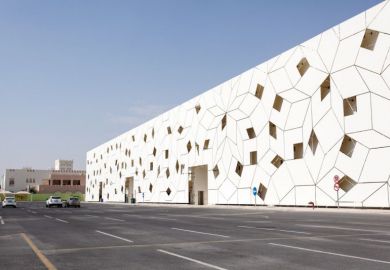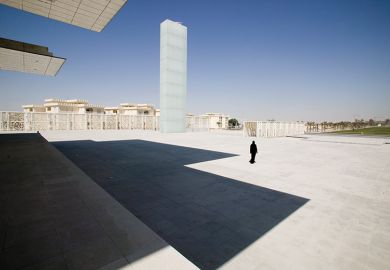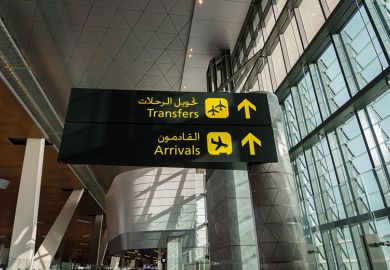Since its launch in 1997, Education City in Qatar has grown to host eight universities, most of which are branches of prestigious US colleges.
But it is the most recent addition to the site that is currently in the global spotlight, with Education City Stadium, a 45,000-seat arena, hosting some of the world’s most famous footballers for the World Cup.
Hosting one of the largest sporting events on the planet has disrupted university life at Education City for now, but what impact will it have in the future?
And with issues of freedom of expression drawing global attention throughout the tournament, should Fifa, the event’s organisers, have learned from higher education’s longer experience of operating in Qatar?
“The World Cup is a branding opportunity of a lifetime for a country like Qatar,” Geoff Harkness, formerly postdoctoral teaching fellow at Northwestern and Carnegie Mellon universities’ Education City outposts, told Times Higher Education.
“Education, and Education City in particular, is a big part of the image that Qatar is trying to project to the world, using the World Cup as a platform to do so.
“It aspires to be one of the intellectual leaders in the Middle East.”
Dr Harkness, who was in Qatar when the country won the rights to host the World Cup, said that freedom of expression concerns were prominent in 2010 and that it was “no surprise” that they have resurfaced so quickly now that the tournament has begun.
“I think Fifa is getting a crash course in what American universities have been slowly experiencing over the past decade,” said Sarah McLaughlin, senior scholar on global expression at the Foundation for Individual Rights and Expression (Fire).
Universities have tended to promise students and staff in Qatar that they would enjoy the same experience and rights as would be found on their US campuses, but they often quickly discover that this is not possible, she said.
“The policy was that there was academic freedom, but the reality was that there was a lot of academic constraint and self-censorship, and at times there was government censorship of academic materials,” said Dr Harkness.
A lack of academic freedom, which is not unique to Qatar, was one of the reasons Dr Harkness gave for leaving the country in 2013.
“There’s always the concern that if you say or do the wrong thing, show the wrong film, give the wrong opinion, quote the wrong author, that you could be deported,” he said.
“You always felt that the knock on the door was going to come at three o’clock in the morning – I lived in a constant state of very mild fear that I was going to be deported, and that’s exactly what the government wants.”
Craig LaMay, director of the journalism and strategic communications programme at Northwestern University in Qatar, said the Qatari government was unlikely to act in such a cloak-and-dagger fashion and would more likely find a bureaucratic way to quietly end the stay of a scholar it disapproved of. He did, nevertheless, agree that “draconian” laws made it difficult to run a journalism school, let alone a university, as one would in the US.
“Every time my students leave the building, I have to worry about them running into a security guard somewhere,” he said.
Professor LaMay said that while he was dean of the Northwestern campus, he was ordered by the Qatar Foundation – the state-led organisation that runs Education City – to shut down an event because a band with an openly gay lead singer was on the schedule.
Having worked in Qatar for eight years, Professor LaMay had hoped that the global spotlight of the World Cup would compel the Gulf nation to liberalise, but he now felt such a change was unlikely.
For its part, the Qatar Foundation argued that “by seeing and hearing with their own eyes and ears, more international applicants will consider exploring the life-changing potential of studying in Qatar”. It added that each university was expected to maintain the same high standards of their respective home campuses, and that the foundation prized academic freedom as the highest value.
But Professor LaMay remained unconvinced and uncertain about the country’s prospects as a higher education destination, noting that a lot of institutions were rethinking the value of international campuses more widely, not just in Qatar.
“It could be a bit of a warning bell that if you want to practise your religion freely or be open about your sexuality, then maybe this isn’t the place for you,” said Ms McLaughlin.
But she admitted that with a “pretty powerful PR campaign”, not everyone was likely to be deterred from coming to Qatar by the furore surrounding the World Cup.
Many would still be tempted by the impressive facilities and opportunities for career progression, added Dr Harkness, now associate professor of sociology at Rhode Island College.
“The World Cup, for many, will make Qatar look appealing and attractive, and certainly that would carry over into any occupation and field,” he said.
POSTSCRIPT:
Print headline: Will World Cup be an own goal for campuses in Qatar?
Register to continue
Why register?
- Registration is free and only takes a moment
- Once registered, you can read 3 articles a month
- Sign up for our newsletter
Subscribe
Or subscribe for unlimited access to:
- Unlimited access to news, views, insights & reviews
- Digital editions
- Digital access to THE’s university and college rankings analysis
Already registered or a current subscriber?








